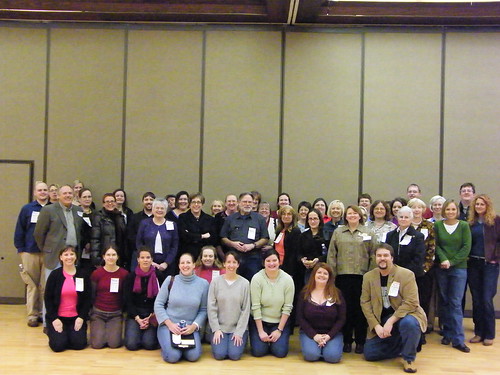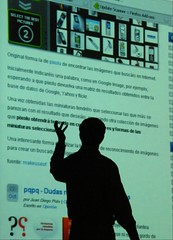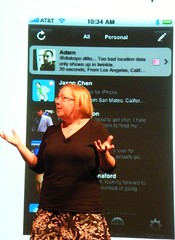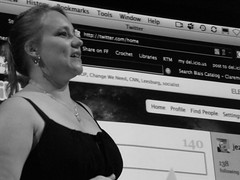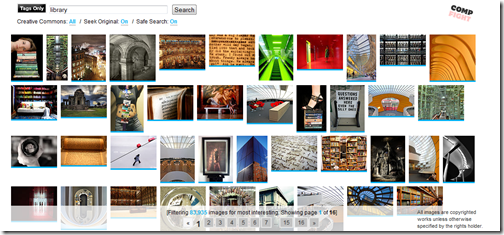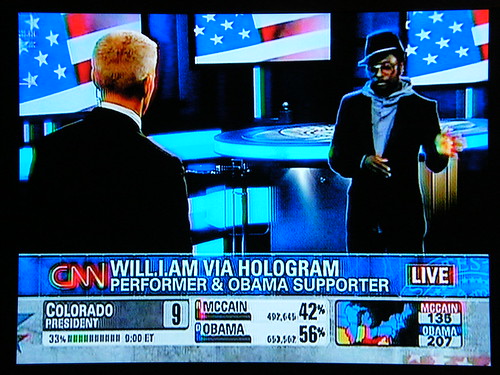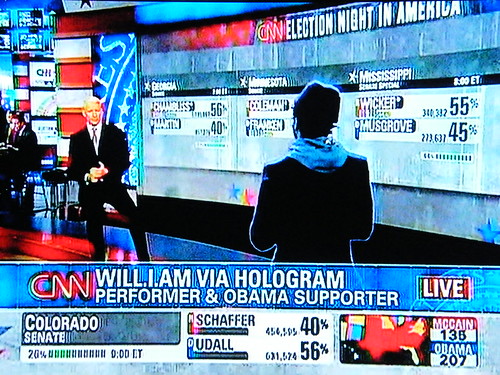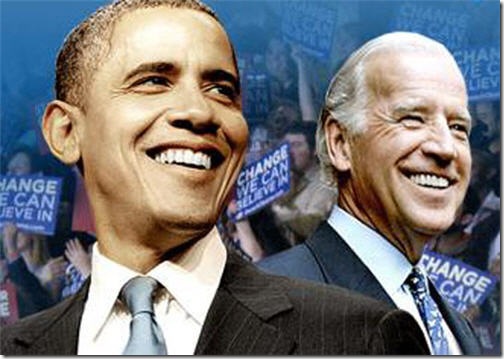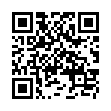Wednesday, November 26, 2008
Thing #13: What am I doing now?
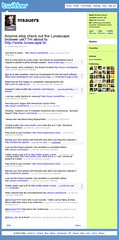 I love Twitter but I'll admit that I understand when people just don't just get it. Honestly, it's not all "I had waffles for breakfast" and "I love my new shoes." I'm not saying that that doesn't happen but there's more to it than that.
I love Twitter but I'll admit that I understand when people just don't just get it. Honestly, it's not all "I had waffles for breakfast" and "I love my new shoes." I'm not saying that that doesn't happen but there's more to it than that.
To demonstrate I took a screenshot of my most recent tweets. This wasn't planned so I had no idea what was going to be there. (Click on the image to the right for the full size version.) Granted there's a few comments on what's happening me, and a few frivolous links (the plush bantha & playing Doom in your browser,) but much of it is participating in the conversation with my friends and colleagues, and the posting of links that might be of interest to my friends and colleagues.
Many times I use Twitter to post calls for comment or assistance. If I'm developing a new PowerPoint I'll often post a draft online then solicit comment via Twitter. Within minutes I usually have a handful of responses from people I trust.
I've also set up my Twitter account to automatically post links to new blog posts and a few other resources that I regularly contribute to. (You need to use TwitterFeed to do this.) However I will mention that I've moved much of the actual conversation over to FriendFeed which is like twitter on steroids. (Maybe we'll cover FriendFeed in the next version of the Nebraska Learns 2.0 program.)
What I can't stress enough is the need to give Twitter more than 48 hours and to make sure you participate before you give up on it. At first glance it does seem useless but in the long run it does start to make sense.
Labels: NELearns2.0, twitter
Monday, November 24, 2008
Saturday, November 22, 2008
Friday, November 21, 2008
OCLC and CC
 Almost every time I hear someone from OCLC speak in defense on their forthcoming Policy for Use and Transfer of WorldCat® Records they mention Creative Commons. Granted they insist that CC was something that "inspired" their license but they keep repeating the the new OCLC license is very similar to a CC BY-NC-SA license. On it's face, this is true, but something has been bugging me about this comparison. Yesterday I thought I'd finally figured out what my problem was. Today this line of thought hasn't changed so I share it with you now.
Almost every time I hear someone from OCLC speak in defense on their forthcoming Policy for Use and Transfer of WorldCat® Records they mention Creative Commons. Granted they insist that CC was something that "inspired" their license but they keep repeating the the new OCLC license is very similar to a CC BY-NC-SA license. On it's face, this is true, but something has been bugging me about this comparison. Yesterday I thought I'd finally figured out what my problem was. Today this line of thought hasn't changed so I share it with you now.
Let's say I create something, a photo for example, and assign a CC BY-NC-SA license, that means that others are free to use my photo as long as they attribute me as the creator, use it non-commercially, and pass my license along on whatever they create using my photo. So far, so good. What this CC license does not allow me to do is to control how my photo is used beyond those three items. As long as they are following those three items, I do not have the right to say that I approve of a certain use and not approve of a different use. This is the right I am waiving by using this, or pretty much any other, CC license.
In fact, at least one of my photos has been used in a way that I wouldn't necessarily have approved of. You can read the story in a post of mine from 7 November 2006 if you're interested in the details. Basically, a photo of mine was used to illustrate a point that I completely disagreed with and was the opposite of the point I was trying to make by taking the photo in the first place. This is the risk I take by using a CC license and I have to live with that if I want people to use my work via this method.
OCLC on the other hand wants it both ways. They want to use a license that sounds a lot similar to CC BY-NC-SA but then adds the following:
4. Reasonable Use. Use must not discourage the contribution of bibliographic and holdings data to WorldCat or substantially replicate the function, purpose, and/or size of WorldCat.
So, what OCLC is saying is that you're welcome to use "their" records (I'm not going to debate here wether these records are theirs or not, that's a different discussion) as long as you attribute the source, use it non-commercially, pass the license along, and with their approval of your use.
That, my friends, is my problem with them mentioning CC in their defense of the new license. It's a slap in the face of Creative Commons.
UPDATE 11/24/08:
After thinking about this some more I add the further thought. The new license is more like CC BY-NC-ND. In other words they're by default, not allowing derivative works. Please OCLC, if you're going to continue to associate your new license with CC, then associate it with the correct CC license.
Labels: creativecommons, oclc
Thursday, November 20, 2008
Thing #12: A Thing about LibraryThing
I love LibraryThing. I've got more than 4100 books listed in my account. Granted, I'm a book collector so I already had a database of my collection so I just exported the ISBNs from that database and imported them into LibraryThing. That doesn't mean that I've tagged every book, or that my whole collection is in there (that original import didn't include any non-fiction) but it's still a big help. Now I can access my collection on my cell phone to answer that age-old question: Do I already own this?
And, did you know that if you've published a book or two and someone has cataloged your titles in LibraryThing you can get your own LT Author page?
Besides Tim's a great guy and I've met his rhino.
Labels: LibraryThing, NELearns2.0
Reflections on Library Camp Nebraska 2008
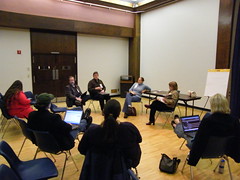 Library Camp Nebraska was the first full event that I suggested, organized and implemented. It's now the next day and I'm still exhausted. From the original idea after attending Library Camp Kansas back in March, through our event yesterday, there was a lot of planning and preparation to have yesterday go off as well as it did. Before I talk specifics I want to specifically thank Christa Burns, Diane Wells, Karin Dalziel, and Scott Childers for all their help throughout the process. I couldn't have done it without you.
Library Camp Nebraska was the first full event that I suggested, organized and implemented. It's now the next day and I'm still exhausted. From the original idea after attending Library Camp Kansas back in March, through our event yesterday, there was a lot of planning and preparation to have yesterday go off as well as it did. Before I talk specifics I want to specifically thank Christa Burns, Diane Wells, Karin Dalziel, and Scott Childers for all their help throughout the process. I couldn't have done it without you.
So, what happened at Library Camp? In a word, conversation. 51 librarians arrived about 9am for registration and refreshments. At 9:30 we all gathered in the main room to decide the day's topics. These topics ranged from Using Web 2.0 for Marketing, Distance Education, Youth Services, Going Green, Social Bookmarking, OCLC, Privacy, Recruitment, Advocacy, Web Design, High Tech vs. High Touch, Cheap and Free Tools, and my personal favorite Wildly Impractical Expensive Ideas for your Library.
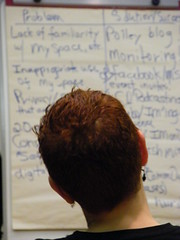 We ended up with three one-our sessions along with the impractical topic being the lunch-time topic. In each session the person who suggested the topic was assigned to be the conversation facilitator and asked that one person in each room also put their notes directly into the wiki. (Some rooms ended up having no one with a laptop so those notes should appear on the wiki in the next few days.) All of those notes can be read, and contributed to on the Notes from the day page.
We ended up with three one-our sessions along with the impractical topic being the lunch-time topic. In each session the person who suggested the topic was assigned to be the conversation facilitator and asked that one person in each room also put their notes directly into the wiki. (Some rooms ended up having no one with a laptop so those notes should appear on the wiki in the next few days.) All of those notes can be read, and contributed to on the Notes from the day page.
As the event organizer I didn't hide myself in any one room during each session. I wandered from room to room taking photos (check out the Flickr pool) and listening. I did contribute to a few topics but I didn't want anyone to think I was in charge of anything. The point was to let the conversations go wherever they ended up going. As one person commented at the end of the day, that's exactly what happened.
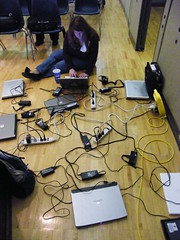 I did notice that the largest groups were around the two sessions on using Web 2.0 tools for marketing. The smallest sessions were the repeated High Tech vs. High Touch (the group in the morning version was much larger so maybe that one didn't need to be repeated in the afternoon) and the privacy discussion. (I'll also note that four of the five people in that room were NLC staff which I found interesting.)
I did notice that the largest groups were around the two sessions on using Web 2.0 tools for marketing. The smallest sessions were the repeated High Tech vs. High Touch (the group in the morning version was much larger so maybe that one didn't need to be repeated in the afternoon) and the privacy discussion. (I'll also note that four of the five people in that room were NLC staff which I found interesting.)
The range of attendees were wonderful. From directors to front-line staff, academic to public to school librarians, someone one-month from their MLS to those that have been in the profession for decades. We even had one tech consultant from the Iowa state library spend the day with us and commenting that he was going to recommend doing this in his state.
I totally forgot to press the record button on the video camera for the opening session and therefor decided to eschew the video camera the rest of the day. The tripod however was put to great use for a group photo near the end of the day.
During the wrap-up session we discussed what happened during the day, should we do it again (a resounding "yes!") and what should be done differently. A few of us ever heard off the record comments that this was better than the annual state conference.
I'm officially declaring Library Camp Nebraska 2008 a success. The plan now is to do one out in the western end of the state involving folks from Wyoming and South Dakota too. Keep an eye out on the Commission blog for details to follow (hopefully) early next year.
Thanks again to all the attendees. You are what made it the success it was.
Labels: conference, libcampnebraska08
More conference photography tips
 As a follow-up to my 10 Tips for Photographing a Conference post here's a link to a short yet informative post on How to shoot a speaker: Timing and lighting. This one gets a little more technical, speaking about ISO settings and f-stops for those that understand those things. (I'm still working on that.)
As a follow-up to my 10 Tips for Photographing a Conference post here's a link to a short yet informative post on How to shoot a speaker: Timing and lighting. This one gets a little more technical, speaking about ISO settings and f-stops for those that understand those things. (I'm still working on that.)
Labels: photography
Wednesday, November 19, 2008
Library Camp Nebraska is today!
If you’re not attending you can follow along in the FriendFeed room or, in testing out something new… right here. Library Camp is scheduled to run from 9am-4pm CST. If you'd like to leave a comment just create a FriendFeed account if you don't already have one, log in, and click the appropriate Comment link.
Labels: conference, libcampnebraska08
Thursday, November 13, 2008
Amazing Star Wars photos
The photographer is Cedric Delsaux and you can find his work at http://www.cedricdelsaux.com/. (Click on "enter" then "Series" for the rest of the Star Wars-themes photos.)
Labels: photography, science fiction, starwars
Thing #11: Blog about Technology, or, where do I get the time?
 When asked "where do you find the time to do all this online social stuff?" I always begin my answer with "well, I'm one of the luck ones. It's my job to do all this online social stuff." Granted, I also do it at home but unlike some of you, and I assume most all of you reading this as part of Nebraska Learns 2.0, I've expected to do this on work time. However I will quickly add that after "doing" then then have to "think", "analyze", "synthesize", "apply", and "present" on the "fun" I've been having to others to show them how they can make the most of these technologies with what little time they have. So yes, I do have fun at my job but it is work too.
When asked "where do you find the time to do all this online social stuff?" I always begin my answer with "well, I'm one of the luck ones. It's my job to do all this online social stuff." Granted, I also do it at home but unlike some of you, and I assume most all of you reading this as part of Nebraska Learns 2.0, I've expected to do this on work time. However I will quickly add that after "doing" then then have to "think", "analyze", "synthesize", "apply", and "present" on the "fun" I've been having to others to show them how they can make the most of these technologies with what little time they have. So yes, I do have fun at my job but it is work too.
But that doesn't actually answer the question does it. When I'm asked where does "Michael" find the time my guess is that the questioner really wants to know how are "they" going to find the time in their already busy schedule. Well folks, here's the hard truth: hard as you may look you might not find the time but that doesn't mean you can't get away with making the time.
Here's how B.L. Ochman put it in her recent blog post "The Secret to Finding Time For Social Media":
Here's the secret: Pick a couple of social networks -- mine are Twitter and LinkedIn -- and concentrate on those. You can't be everywhere and you don't need to be everywhere, unless you want to be like this dog chasing its tail.
The key to all this is "focus". (Man I'm using a lot of quotation marks in this post.) In the Nebraska Learns 2.0 program we're having you experiment with literally dozens of different online services and tools. No one on this end expects you to use all of them once the program is over. In fact, no one here expects you to even find all of them useful. (In fact, even we don't all agree on which ones are useful.)
But none of this means that you can get away with avoiding these technologies and still be considered, dare I say, relevant.
Libraries are facing tough times in this economic climate. Philadelphia is closing eleven branches to help alleviate a budget shortfall. Trouble is, studies show that as money gets tighter, people use the public library more. I'm not saying that your ability to blog will save your library from closing but if the specter comes calling, your blog will be yet another avenue to alert the faithful.
Twitter might seem both interesting and incomprehensible at first, but the more your participate the more it makes sense. I know some participants have searched the Twitter archives for the name of their town. What if you found a "I wonder what the population of [insert name of your town here] is?" How about using your Twitter account to send them an answer. I'd find it so cool to wonder out loud to to cyberspace and to have a librarian magically appear with the answer completely unbidden. (Did you know there are ways to find Tweets based on geography? Imagine following Twitter users that live in are visiting your town and then helping them when they need it.)
Is technology, or more specifically online social media, the solution to all our problems? Of course not. However they are tools that are available to us and we ignore them at our peril.
Image: badboy69
Labels: NELearns2.0, socialweb
Wednesday, November 12, 2008
There's Still Room for You @ Library Camp
 There are still plenty of seats available in Library Camp Nebraska one week from today. Sign up now! It’s totally free and totally fun!
There are still plenty of seats available in Library Camp Nebraska one week from today. Sign up now! It’s totally free and totally fun!
Potential topics to be discussed currently include:
- The Social Web in the library
- Cheap and free tech tools
- Copyright & Creative Commons
- Public programs
- High Tech / High Touch: are they mutually exlusive?
- Get your free Web presence (for libraries that don't have one already)
- Privacy in a Social Web world
- Wildly impractical, expensive ideas for your library
- Alternative searching techniques (or, what's new & cool in the world of searching??)
- Ideas for library marketing on the cheap
- Ideas for new granting agencies/funding sources and/or grant success stories
- Demythologizing the "information wants to be free" (while information may want to be free, it aint cheap to provide it...)
- Community Outreach
- Mentoring
- Instruction
- Expanding the role of the library on campus (PR/marketing/collaboration)
- Exploring the future of library workers: What's the greatest need in Nebraska?...support for Master's level v. pre-professional training?
Full details @ http://librarycampnebraska.pbwiki.com/
Labels: conference, nebraska, NLC
Monday, November 10, 2008
Now I want a digital SLR
 I've been avoiding even considering a digital SLR and sticking with my 18x optical zoom Fuji point-and-shoot for several reasons. One, the Fuji takes great photos. Two, I don't even know how to use all the settings on the "simple" camera I have. Third, and most importantly, I can't afford all lenses that I'd want. Well, the Super-Secret Spy Lens is seriously tempting me.
I've been avoiding even considering a digital SLR and sticking with my 18x optical zoom Fuji point-and-shoot for several reasons. One, the Fuji takes great photos. Two, I don't even know how to use all the settings on the "simple" camera I have. Third, and most importantly, I can't afford all lenses that I'd want. Well, the Super-Secret Spy Lens is seriously tempting me.
Meant to fit the end of your SLR's zoom lens, this guy has a secret cut-out on the side and a precision mirror assembly inside. In short, you can shoot left, right, up, or down (it swivels 360 degrees), all while appearing to shoot straight ahead.
And it's just $50!
Labels: photography
Friday, November 07, 2008
Obama wins one electoral vote in Nebraska
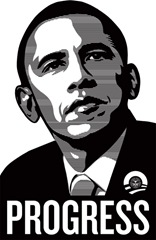 Nebraska politics.. In the words of Hunter S. Thompson: when the going gets weird, the weird go pro.
Nebraska politics.. In the words of Hunter S. Thompson: when the going gets weird, the weird go pro.
Did you know that Nebraska has a unicameral legislature? In other words, there’s just the Senate, no house. (To me it makes sense (I almost wrote a paper on it in college) but that’s a completely different post.) Also, we’re one of just two states that splits it’s electoral votes. (The other one is Maine.) Thing is, it’s never happened before in the history of the state! This evening it was announced that John McCain got four, and Barack Obama got one.
How does it work? Let me see if I can explain it.
Step one: The winner of the popular vote for the state gets two electoral votes.
Step two: The winner in each of our three congressional districts gets one electoral vote for each district they won.
In the past, the man who won the whole state did so by winning all three congressional districts. This time John McCain won just two of the three districts. So, he got four, and Obama got the other one.
My only disappointment is that I live in one of the other two congressional districts.
10 Tips for Photographing a Conference
The Digital Photograph School blog has an excellent article on how to take great photos at conferences. Here's the quick list:
- Bring extra batteries, memory cards, your cables, and chargers
- Get out of auto mode.
- Be unobtrusive. Casual shots are better.
- Pay attention to the background
- Try not to use the flash
- Pay attention to the lighting
- Set the white balance
- More is better
- Zoom less, walk more
- Have fun
- (Bonus) It isn’t the camera or the lens, it’s the photographer that counts.
I thought about my experience at this past IL2008 conference and I found that I followed many of these tips. Most of my best photos were less zoom and more "get closer" as with the three in this post.
As for the suggestions to use more manual settings I guess I've just got to finally learn what all those other settings on my camera do.
Labels: il2008, photography
Of routers and Chrome
Three routers, three different brands (Linksys, TRENDnet & Gateway) and whenever I log into the router using Google Chrome, change a setting and click the button to commit my changes I get this screen:
What is it about routers and .tri pages that Chrome doesn't like?
A day of touchiness
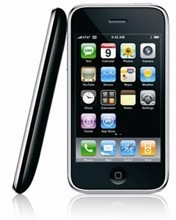 Yesterday I tried to use just an iPod Touch to do my work. Surprisingly it went well and I got most of what I needed to do (online anyway) done with a minimal of hassle. That doesn't mean it was a perfect experience. Here's my comments on this experiment based on the notes and reflections from the day.
Yesterday I tried to use just an iPod Touch to do my work. Surprisingly it went well and I got most of what I needed to do (online anyway) done with a minimal of hassle. That doesn't mean it was a perfect experience. Here's my comments on this experiment based on the notes and reflections from the day.
I turned it on at about 7:30 am and pretty much insisted that I would do any Web surfing and e-mail on the Touch. This overall worked rather well. The e-mail app is way better than the one on my cell phone and Safari is a tolerably good browser. For some specific sites such as MySpace and Facebook I did end up installing site-specific apps which made those sites much easier to use.
For Twitter I originally tried Twitterific but decided it just did work the way I thought it should. I then switched to TwitterFon and that much more fit my Tiwttering style.I found the Delicious App which gave me full access to all my bookmarks but I thought it was supposed to give me a way to also add and edit my bookmarks. If that functionality exists in this program, I'm totally missing it. I also found and installed Wikiamo (a Wikipedia app) and Instapaper (a site I use to mark Web pages for later reading.) Both worked extremely well though Instapaper required a little bit of a setup to get their "Read later" bookmaklet to work but that was a function of how Safari works on this platform and wasn't Instapaper's fault. Wikiamo basically reformats Wikipedia pages for better Touch-based reading. I highly recommend it for anyone who uses Wikipedia regularly.
As for reading my feeds via Bloglines, I've got some issues. I'm not saying it was impossible or even difficult but there were many small annoyances. First off, Bloglines insists on forcing iPod users into an iPod-specific version of the site. Herein lies the problem. There is a "mobile" version of Bloglines which I've been using on my smartphone for a while now and that works great. (Especially since in Bloglines proper you can set certain feeds and folders to NOT display in the mobile version.) However, it seems that on the iPod you can not use the mobile version. Try to go there in Safari and you just get a blank page. But, in the iPod version of the site there's some issues.
First, you can't collapse a folder. So, if you've got a folder with a lot of feeds in it, you must scroll past the every feed to get to what's below. Second, since this isn't technically the mobile version of the site, feeds and folders marked as "don't display in mobile" are displayed. Third, there's no way to mark an item as "keep new" for later reading. Fourth, there's no way to add a new feed.
Granted, none of these issues kept me from reading my content but let's just say it caused some problems with my standard workflow.
As to the keyboard, well, I wouldn't want to write anything more than a paragraph or two at a time. (This post is being written on my desktop computer with a full ergonomic keyboard.) I found that when I stopped worrying about the keyboard itself, I actually ended up typing with more accuracy. In other words, just type and it'll probably come out ok.
One other note about e-mail. I am a smidge bothered by the automatic insertion of "Sent from my iPod" into every e-mail I created. It did get one co-worker to ask me about it later in the day and that was cool but as I thought about it more, Apple is basically inserting an advertisement into my e-mail. That bothers me. (Yes, I can delete it but I shouldn't have to.)
The one significant bother with the whole thing is its inability to sync my task list. Then again, this isn't really Apple's fault. We run an Exchange server here so the iPod perfectly syncs my e-mail, contacts, and calendar; automatically and wirelessly. A definite improvement over the "attach a cable and wait" that is involved with my Windows Mobile smartphone. However, that cable connection syncs my Outlook task list to my phone. Since Exchange doesn't track your local task list, there's no way to sync it along with the other content. I'm not getting an iPhone so it's not like my task list won't be with me anyway. (Yes, I could move to something online like RememberTheMilk but I'm pretty wedded to Outlook for better or for worse.)
This is all not to say that I didn't use my desktop computer at all yesterday. I had some video to edit and render and some photos to upload to Flickr. Neither of those tasks could have been done on the iPod.
At 3pm the iPod told me that the battery was down to just 20%. That's about 7.5 hours of near constant use with full WiFi connectivity just about the whole time. (The WiFi in our building could stand to use a few additional antennas in some areas.) Considering I leave the office at 4pm, I'd say that the battery life on this thing is way more than respectable.
So, in the end, what do I think? I can say I'm still in love. Is it perfect? No. But what relationship is? I've found that if it can get me through a whole day I'm sure it could get me through being on the road. (Though I like to bring a lot of video with me on trips and I'm not going to spend time converting it just to watch it on a small screen.) I'll still be making an official recommendation that those of us who travel should have one of these as if you're not trying to do anything too special, it's nearly a perfect travel too for online access.
Labels: apple, ipod, mobile computing
Free Obama Sticker
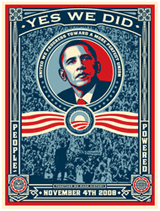 MoveOn.org is offering free “Yes We Did” stickers for a limited time. Get yours @ http://pol.moveon.org/shepstickers?id=15080-10226106-YaBATEx&t=5.
MoveOn.org is offering free “Yes We Did” stickers for a limited time. Get yours @ http://pol.moveon.org/shepstickers?id=15080-10226106-YaBATEx&t=5.
Labels: obama
Wednesday, November 05, 2008
Posting via touch
Having not found a free blogging app that works with a Blogger blog that's published on a third party server, e.g. this one I'm writing this post directly into Blogger. Well it works but I'm not sure just how much typing I'm willing to do via the iPod Touch's onscreen keyboard. Tomorrow the plan is to do as much of my day's work on this thing. Let's see how that turns out...
Labels: ipod, mobile computing
Thing #10.5: statr for flickr

(If you're viewing this on the day it was posted it's not all that impressive since it's only got 24-hours worth of stats. Over time it'll get more interesting, promise.)
Labels: flickr, NELearns2.0
Thing #10: Image Generators
I love image generators. I have over 60 bookmarked in my Delicious account and subscribe to the Generator Blog. As I mentioned in my previous post, I tend to use them on this blog and in presentations. Here's a fun one that I've not actually used in a presentation... yet.
Labels: generator, NELearns2.0
Thing #9: Compfight
Compfight is an indispensable tool for me, one I use almost daily. I'm constantly looking for a photo to illustrate a point. Wether it's for a blog post or a presentation, I love using photos to make a point. I'm also generally sure to use only Creative Commons (cc) licensed photos in my work. Not only does this ensure that I'm not going to be sued but it promotes CC and lets me turn my presentations into teaching moments about more than just the direct topic of the talk itself.
But why Compfight instead of the standard flickr search option? Check out these two screenshots showing search results for library:
Srs'ly? Can you no doubt the usefulness of Compfight. Same search, completely different screen full of results. I'm less concerned with the content of the results (though I think Compfight's better at that too) but more with how those results are presented. Compfight gives you screens full of images that you can look and and choose from. Flickr, you get 25 at a time with a lot of scrolling involved. Clicking on any one of these images takes you to the photo's page for further details and downloading.
Yea Compfight! My presentations are better because of you.
Labels: creativecommons, flickr, NELearns2.0
Thing #8: Billy's new bike
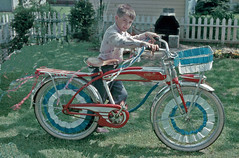 Billy's new bike
Originally uploaded by Travelin' Librarian
Billy's new bike
Originally uploaded by Travelin' LibrarianLabels: flickr, NELearns2.0
Help me Anderson, you're my only hope
If you were watching CNN last night you might caught a live television first, interview via "hologram". Well, sort of. Now don't get me wrong, this was totally cool and I instantly thought of Princess Leia in Star Wars. (Then again, so did the first person they did this with.) In case you missed it, here's what Wil.i.am looked like:
And here's the reverse angle:
As described by CNN, the hologrammed person was standing inside a tent with about 35 high definition cameras surrounding them which were synchronized with the in-studio cameras in order to show the correct angle of the person on the broadcast. Please keep in mind that Anderson Cooper in these images is not actually seeing the person standing there. At best, he's looking at an off-screen monitor. (One can only hope that monitor was in the shape of R2-D2.) The hologram isn't truly a hologram in that sense. The remote person is being added into the broadcast signal so us at home can see them; he's not an image free-floating in the studio. (OK, honestly, that's how I think it worked. If I'm totally wrong, please correct me.)
Overall the effect was definitely cool. The thin blue outline around the beamed-in folks added a bit of sci-fi to the whole thing which I'm not sure was good or bad. On the one hand it was a smidge distracting. On the other, it made it clear that the person wasn't really there and in the case of a news report I'd like to keep things as "real" as possible.
Update: io9 has the video of the Will.i.am appearance.
Labels: CNN, star wars, technology
Tuesday, November 04, 2008
Now there's an idea
For a few years now I've been on the record as believing that before we completely ditch Dewey or another standard library organizational scheme maybe we should try something a little more simple. For example, just putting up better signage in the library. And, now I've got a patron who, knowingly or not, is on my side. VCU Libraries Library Suggestion Blog recently posted the following suggestion:
For students browsing for books, I suggest the library put up book categories/subject titles on the ends of each bookcase, below the call numbers. This can make it significantly easier to find where we are when looking for books in the library -- after all, we process words much faster than alphanumeric call numbers. Thank you!
From: an undergraduate student
Since it's so short I'll repost the complete response here:
Patricia Selinger, Head, Preservation Department, VCU Libraries, responds...
Thank you for this great suggestion! The Preservation Department is responsible for maintaining the call number guides throughout the stacks. With our stacks overcrowded, we shift collections regularly to make room for new materials. The call number guides become obsolete quickly in this environment. We haven't had subject guides before but we are looking at solutions that will help students browse by subject. Look for posters in the near future.
In other words, here's a patron who thinks that just putting a bunch of numbers at the end of an aisle isn't very useful and instead suggests that we use actual words instead, or at least in addition to the numbers. Hey, I bet if you did that, your collection would be instantly more "browseable" without moving, recataloging, and relabeling everything.
But, I still have a question: Admitting that this is based on an assumption on my part but why the heck is the "preservation department" in charge of signage. My assumption is that this department doesn't exactly interact with the library's users with any regularity. Shouldn't those in charge of the signage actually know how the collection is being used via direct observation? Besides, what does directional signage have to do with preservation of the collection anyway? (Maybe you can preserve the collection by making sure no one can find what they're looking for. No use = long-term preservation? ;-)


